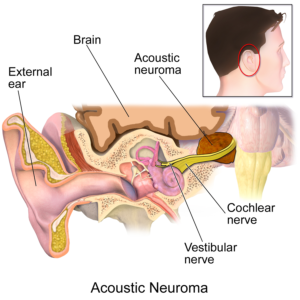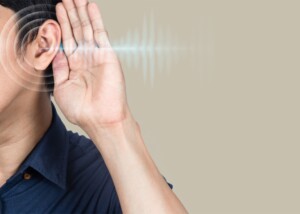
Many tinnitus sufferers are aware that the noise is louder in one ear than the other, and/or is of a different frequency.
In other words, one ear may be perceived to have a tone of 7,000 Hz that’s barely audible as far as how “soft” it is, while the other ear is “louder” and seems to be ringing at 11,000 Hz.
Or, the perceived frequency may be the same, but it’s louder in one ear than the other.
“Tinnitus is often bilateral, but (when unilateral or louder in one ear) is usually perceived as louder in the worse ear, i.e., where there’s more cochlear hair cell damage and more sensorineural hearing loss measured,” explains Rachel Raphael, M.A., CCC-A, an audiologist with ENT Baltimore.
“The frequency of maximal hearing loss often matches the pitch of the tinnitus,” says Raphael.
“This is our brain’s way of recognizing damage and alerting a patient to seek out treatment.
“Asymmetric hearing loss and tinnitus are also suspicious for acoustic neuromas (benign auditory tumors) that must be ruled out.”
An acoustic neuroma typically presents with unilateral (one ear only) tinnitus.

Blausen.com staff/CC
It’s extremely unlikely, then, for a tinnitus that’s being perceived in both ears (even if one ear is louder than the other) to be emanating from a single tumor.
However, unilateral tinnitus is not always caused by one of these tumors, either.
Incidence of Acoustic Neuroma (aka Vestibular Schwannoma) in the U.S.
• 2,000 to 3,000 diagnoses per year
• Or one in 100,000 people.
• 5 percent are bilateral, “inherited as part of neurofibromatosis type II,” says hopkinsmedicine.org.
“Most underlying causes of tinnitus (like noise exposure, aging, middle ear fluid, wax impaction, etc.) are not life threatening,” says Raphael.
If left untreated, an acoustic neuroma CAN impinge upon the brainstem, but these masses are very slow growing and create symptoms (that would attract medical intervention) long before they’d ever grow large enough to compress against crucial brain structures.
Do not panic over the possibility that an acoustic neuroma is causing the perception of tinnitus to be louder in one ear than in the other.
“Ringing is more often reported to the doctor or audiologist than is subjective hearing loss,” says Raphael.
“Many of my tinnitus sufferers are not aware of any subjective hearing loss. The loss may be outside of the typical speech range and only revealed by a proper hearing test.”
Additional Causes of Tinnitus “Louder” in One Ear
“If the condition is related to anatomical abnormalities such as otosclerosis where a stiffening of the stapes bone in the middle ear occurs, the tinnitus can be perceived in that ear alone or mostly in that ear,” explains Rivka Strom, AuD, CCC-A, chief audiologist at Central Hearing LLC in NY.
“If TMJ is a cause, the side closest to the source of the joint or jaw issue can be experiencing a louder tinnitus sound,” continues Strom.
“If hearing loss is greater in one ear or if an individual is exposed to a dangerously loud sound that is close to one ear, asymmetrical or unilateral tinnitus can occur.

Dr. Strom is a member of the American Speech Language and Hearing Association and has received several awards including Brooklyn College’s Excellence In Audiology Award.










































